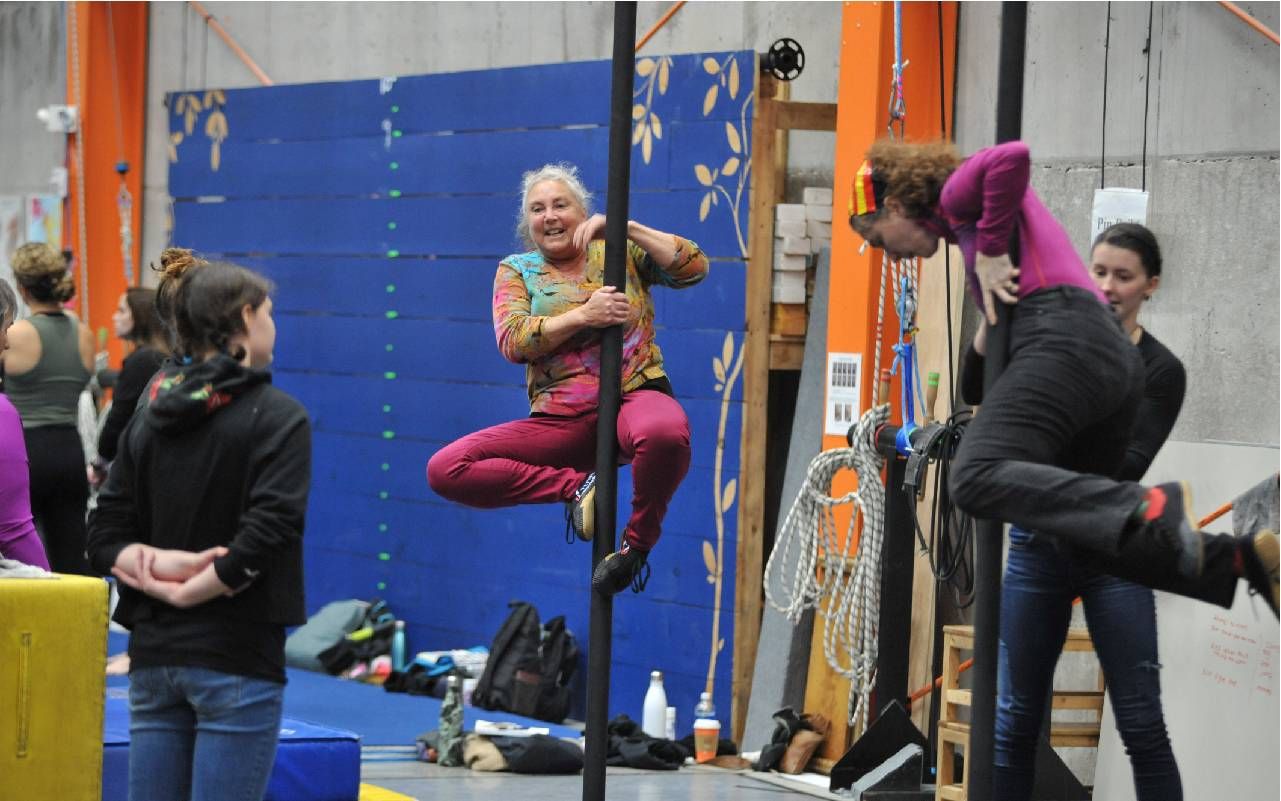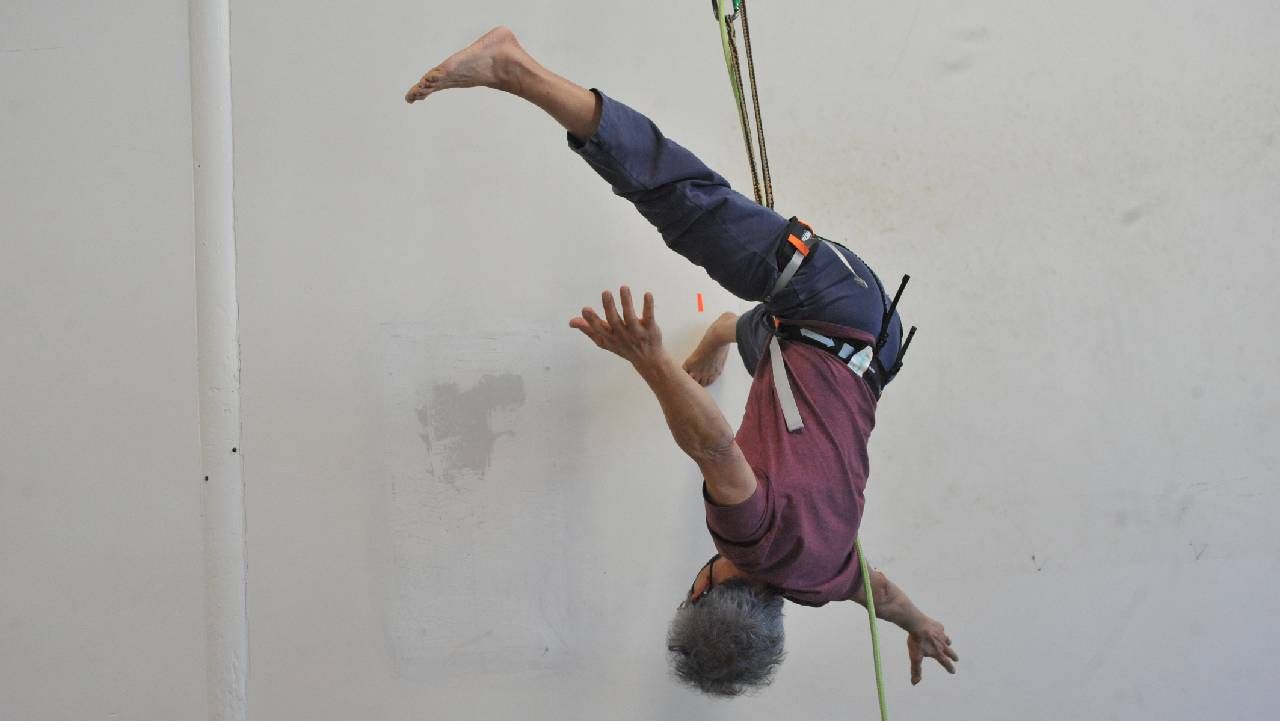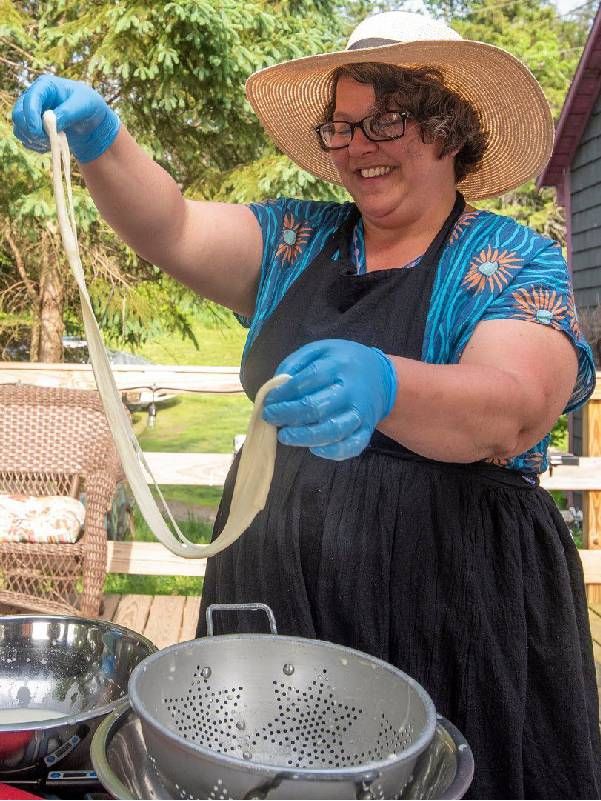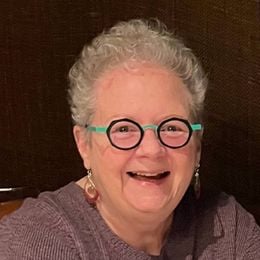Vermont Cities Boast Vibrant Arts, Culture Scenes
Learn homesteading skills, woodworking, cheese-making and (whee!) circus arts
How long will "Boo" Gershun, 64, be able to enjoy taking classes in flying trapeze? "As long as I keep doing it, I'll be able to keep doing it," she said. "The circus arts are a huge part of my life, and a way to stay active." Stuart Tsubota would agree. A retired biology professor, Tsubota, 71, has trained in ground acrobatics, handstands and vertical dance, which he described as "like floating."

Both attend classes at the New England Center for Circus Arts (NECCA) in Brattleboro, Vermont. Tsubota lives there; Gershun and several friends drive from Massachusetts to get their high-flying fix. Home to a professional circus training program, NECCA also offers "circus experiences," weekend workshops and class sessions in aerial work, juggling, wire walking, trampoline and more.
"Age or size doesn't matter, because circus arts are accessible to everybody — and it's so much fun."
"We have many different entry points," said Serenity Smith Forchion, 52, who has performed with her twin Elsie Smith at Cirque du Soleil and with other circuses. They founded NECCA in 2007. Individuals ages 40 and up typically enroll to "rediscover their physicality" or spend time on themselves, Forchion said. Her oldest student was 87, a woman eager to improve her balance.
Fulfilling a childhood dream, Jill Weinstein started training on the trapeze just before turning 40. Now 55, Weinstein coaches at NECCA. "Age or size doesn't matter, because circus arts are accessible to everybody — and it's so much fun," she said. "I especially like helping older students focus on technique, being safe and understanding where you are in space."
Mindfulness is key, Weinstein said, and for her, flying also relieves stress. "You feel really powerful — there's just nothing like it!"
If, like me, you can't entirely dismiss the idea of exploring circus arts, Tsubota, the vertical dancer, has some advice: "You need some flexibility and some strength, but if you're reasonably fit, you should try it."
'Music and Pots Have Always Been My Thing'
The Green Mountain State also offers many arts classes on the ground for travelers just passing through and those inclined to spend some time. Karen Horton, 69, holds pottery classes at Brattleboro Clayworks. After a career teaching music in schools and playing French horn in the local orchestra, Horton revived her longtime interest in pottery after retiring in 2018. "Music and pots have always been my thing," she said, laughing.
Horton's students enroll to try something new or create something with their hands. "Some make planters, and others want a mug," she said. "We always have a wonderful mix of ages, and it's nice to work on something together." Outside class, Horton makes functional items — garlic keepers, berry bowls, casserole dishes and yogurt crocks — that she sells at local street fairs.
Brattleboro also is home to HatchSpace, which draws would-be woodworkers. Workshop participants make cookbook stands, tiled serving trays, decorative boxes or hand-carved wooden spoons.

In Manchester, sculptor Stanton Sears, 72, teaches wood carving at the Southern Vermont Arts Center, where classes and workshops are available in painting, nature photography and embroidery. For design inspiration, Sears' students collect pieces of natural material on the center's grounds and then translate the images onto wood sculptures.
Sears always emphasizes safety. "We work with very sharp tools, and knowing how to carve safely is important," he said. "As a kid, I stabbed myself in my left hand while working with wood, so my first instruction in class is how not to do that."
'Greensboro Is a Destination Town'
Travel about three hours north to Greensboro, and you'll be in good company. "Greensboro is a destination town, saturated with arts and culture," said Carol Fairbank, 50. "We have 700 to 800 residents year 'round, and that skyrockets in the summer. People come for a weekend, a week or longer to visit such a beautiful place."
A first-generation farmer, Fairbank owns Broadfork, where she holds classes in the homestead arts that date back to "the days of living in a village when if you wanted something nice, you had to make it," she said. Her most popular classes are cheese-making, mushroom growing, basketry, broom-making and working with natural dyes.
"I find so much joy in this, whether I teach the classes or bring in a local expert," Fairbank said. "And I'm constantly taking classes myself — I set aside that time to invest in a learning experience, because doing art is one of the highest forms of self-care."

Fairbank has taught several classes at the Highland Center for the Arts. The nonprofit's motto is "Do Something Different," and the center boasts a state-of-the-art theater that seats 300, a smaller performance space and an art gallery.
A highlight there this summer is the Vermont Cheesemakers Festival on Aug. 13, in celebration of Vermont's reputation for premium cheese production by the highest number of cheesemakers (reportedly 40) per capita.
Say "cheese" in Warren, about 60 miles south of Greensboro, and you'll need to clarify whether you're talking about artisanal, specialty or advanced luxury classes at Three Shepherds Cheese, where Linda and Larry Faillace teach the culinary art. The couple has been making cheese for over 30 years and teaching for 26. Linda, 57, estimates they have instructed more than 5,000 people in Vermont and elsewhere, including across the U.S. and in Colombia, Bermuda and Belize.
Locally, about a third of their students just want to learn how cheese is made, a third are passionate foodies who want to make cheese at home and a third are considering making cheese commercially. Laughing, Faillace added, "Sometimes people come in for one reason and end up changing to another."
'I Call Myself a Coach'
Burlington City Arts, in that city on the eastern shore of Lake Champlain, advertises summer classes in pottery, jewelry making, photography, screen printing and painting. Linda E. Jones and Gail Salzman have taught there for well over two decades. Jones, 66, instructs beginners in an introductory class and others in an abstract class; Salzman, 79, teaches advanced painting and experimental drawing.
"The hardest part is getting people to leave their inner critical voice at the door, to let go."
"I call myself a coach," said Salzman. "Students with experience are looking to refresh their techniques, learn a new medium or be inspired by others." Visual art-making, she noted, is "an isolated activity" and being in a group can be stimulating. "One older student who has taken my classes for almost six years drives an hour and a half to get here, and she says the class is a lifeline for her."
Many of Jones' students work with computers. "They come to use the other side of their brain, to express themselves," she said. "The hardest part is getting people to leave their inner critical voice at the door, to let go. I provide lots of support. At the first class, I tell students, 'It's just me, it's just paint — and it's all okay.'"
In Montpelier — the smallest state capital, with a population of about 8,000 — the Montpelier Senior Activity Center holds arts classes in person and online. The Mud Studio, in nearby Waterbury, and The Blockhouse Studio, about 20 miles southwest of Montpelier, hold pottery classes and workshops. The Vermont Crafts Council, based in Montpelier, promotes teaching artists working in many media throughout the state.


